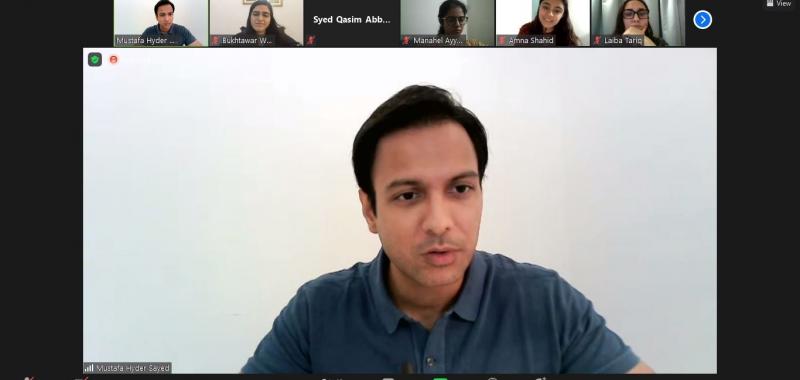
On 3rd June, 2021, the Center for Chinese Legal Studies held an informative discourse on various aspects of the China-Pakistan Economic Corridor (CPEC), flagship project of the larger Belt and Road Initiative (BRI), for the interns. Mr. Mustafa Hyder Sayed, Executive Director of Pakistan-China Institute, led the discussion by addressing some of the questions posed by the participants.
One crucial aspect that Mr. Mustafa touched upon was the impact of CPEC on the changing nature of the global political economy and the world order. Deviating from the traditional financing mechanism of the Bretton Woods System that solely promotes the liberal economic order, BRI offers an alternative to developing countries like Pakistan. A multipronged project like CPEC is expected to transform Pakistan’s economy and have colossal impacts on the transport, infrastructure, communication, and energy sector. It is steered by the joint consultative effort of the National Development and Reform Commission (NDRC) of China and the Ministry of Planning, Development, and Reforms in Pakistan. Apart from establishing Special Economic Zones (SEZs) and bridging the energy deficit, CPEC also focuses on socio-economic development and poverty alleviation programmes. For instance, primary schools have opened for girls in Gwadar and clean water plants and solar projects are launched for local communities in Quetta and Karachi. In Thar, women eke out a living by driving trucks for power projects and providing food catering services. Thus, building sustainable livelihoods is at the heart of the CPEC project.
Mr. Mustafa also shed some light upon the challenges to CPEC. Political instability aggravated by partisan politics, lack of political ownership, capacity issues, and bureaucratic red tape are some of the challenges that had previously stalled the project. Dissemination of information and coordination strategy is also severely lacking. Balochistan is still beset by the security issues as is evident from the recent attacks in the province. Despite the civilian and military leadership being on the same page, challenges to CPEC still persist and they need to be overcome.
Another grave challenge that the CPEC project faces is disinformation warfare. A lot of myths have been circulating regarding Pakistan’s rising external debt and the plight of the Uighur Muslims in China that are largely uncorroborated. These myths are propagated to portray China’s infiltration in the region in a negative light. Mr. Mustafa referenced Kishore Mahbubani’s book, Has China won?, that provides a great insight on how China is painted as a repressive country in the Western discourse. Therefore, myths surrounding CPEC need to be busted through investment in R&D to develop a more positive discourse around this project.
Lastly, he argued that the responsibility lies squarely on the federal and provincial governments of Pakistan to ensure smooth completion of the CPEC projects. It also gives Pakistan a chance to rid itself of the notion of being a terrorist state and abandon its policy of isolationism where it is solely viewed from the Af-Pak prism, and rebrand itself as a country ready for investment and competition. Although this megaproject is not going to solve all of Pakistan’s problems overnight, it is an excellent opportunity that Pakistan needs to leverage to improve its economy and build a positive image and reputation worldwide.








